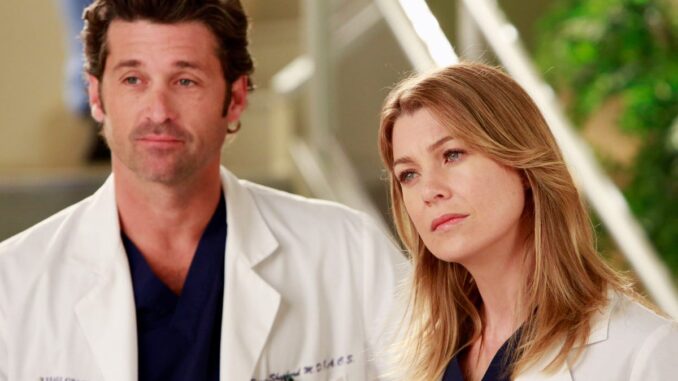
Grey’s Anatomy: The Truth About Jealousy
Seattle Grace Hospital, now Grey Sloan Memorial, is more than just a medical drama; it functions as a living, breathing dissection of the human heart, particularly in its rawest, most inconvenient states. Beyond the scalpels and life-saving procedures, Grey's Anatomy has always excelled at charting the complex arrhythmias of human emotion. Among these, jealousy stands out as a recurring, complex, and often devastating truth. The show, with its intricate web of relationships and high-stakes environment, peels back the layers of this primal emotion, revealing it not merely as a villainous trait, but as a universal symptom of insecurity, fear of loss, and a deep-seated desire for belonging and recognition.
The most iconic and gut-wrenching portrayal of romantic jealousy on Grey's Anatomy undoubtedly manifests in the tumultuous love triangle of Meredith Grey, Derek Shepherd, and Addison Montgomery. When Addison, Derek's estranged wife, strolls back into Seattle Grace, her presence acts as a seismic shockwave, exposing the raw nerve of jealousy in all three characters. Addison, with her righteous indignation and legitimate claim to her marriage, embodies the pain of betrayal and the fury of an abandoned spouse. Her jealousy isn't petty; it's a profound fear of losing her identity and her husband to the "other woman." Meredith, though initially the "other woman," experiences her own brand of insecurity-fueled jealousy. She grapples with the fear that her blossoming, illicit love could never truly compete with a decade-long marriage, constantly questioning her place in Derek's life. And Derek himself, caught between two powerful women, experiences the frustrating helplessness that comes from being the object of such intense, conflicting desires. This storyline illustrates jealousy as a potent cocktail of hurt, anger, and a desperate clinging to what one perceives as rightfully theirs, often leading to destructive choices and profound sorrow for all involved.
Beyond the classic love triangle, Grey's Anatomy delves into more nuanced forms of jealousy, particularly in the realm of conflicting life paths and priorities. The volatile relationship between Cristina Yang and Owen Hunt serves as a prime example. Their jealousy wasn't rooted in another person, but in their divergent visions for the future. Owen deeply yearned for a family, children, and a stable domestic life, while Cristina’s primary devotion was to surgery – her "person." Owen's jealousy was not of another lover, but of Cristina's ambition, of the sheer, uncompromising dedication she poured into her career, which left little room for his domestic dreams. He was jealous of the surgical theater, of the OR, of anything that pulled her focus away from the life he envisioned with her. Conversely, Cristina, in her own way, exhibited a subtle jealousy of Owen's desire for a traditional family, seeing it as a threat to her professional identity and her singular passion. This form of jealousy highlights a soul-deep incompatibility, revealing that envy isn't always about a rival human being, but about perceived threats to one’s core values and life goals, eroding trust and ultimately leading to an inevitable, painful separation.
Moreover, Grey's Anatomy keenly explores professional jealousy, a pervasive force in the cutthroat world of medicine. Surgeons, driven by ambition and a thirst for groundbreaking procedures, often find themselves vying for recognition, promotions, and the most challenging cases. The rivalry between Derek Shepherd and Preston Burke for the Chief of Surgery position, or their unspoken competition for prestigious surgeries, perfectly encapsulates this. Their jealousy isn't born of malice, but of a deeply ingrained desire to be the best, to innovate, to achieve ultimate validation in their chosen field. It's the fear of being outshone, of losing status, or of another surgeon achieving a groundbreaking feat before them. This truth about jealousy demonstrates its dual nature: while it can fuel relentless ambition and push individuals to excel, it can also breed resentment, sabotage, and a constant, exhausting comparison that diminishes personal satisfaction.
Ultimately, Grey's Anatomy shows us that the truth about jealousy is that it is rarely simple. It is a chameleon emotion, changing its colors based on the perceived threat. It is a primal fear of inadequacy, a desperate cling to what we believe we deserve, and an intensely painful reaction to the potential loss of something cherished – whether that's a person, a dream, or a status. It’s not just the green-eyed monster, but often a wounded, insecure creature yearning for affirmation. The show’s characters, in their raw vulnerability, allow us to witness jealousy’s full spectrum: the destructive rage, the quiet despair, the gnawing insecurity, and the sometimes-unconscious motivation it provides. By consistently placing its characters in situations that ignite this potent emotion, Grey's Anatomy serves as a profound medical chart of the soul, illustrating that jealousy, for all its discomfort, is an undeniable, deeply human truth.